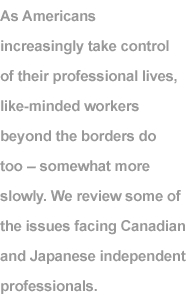 |
|
||||||||||||
 |
|
||||||||||||

|
 |
|
By Brian O'Connell |
While U.S. companies wrestle with a tight job market and the nation's rising number of IPs continue to flex their muscle in the domestic workplace, prospects of foreign IPs grow more slowly. Taxes, local government restrictions about where IP nationals can work, and a growing tendency among U.S. companies to send native IPs overseas make freelancing a dubious -- but not impossible -- career choice in some foreign countries. Dateline -- Toronto In Canada, onerous tax rates are forcing local IPs to send half their income to Revenue Canada (the Canadian IRS). To fight back, more and more independent contractors there are incorporating their businesses, allowing them to pay the 20 percent corporate annual tax rate rather than the 50 percent tax charged individual taxpayers. Unfortunately, it's a loophole that many Canadian IPs don't know about, especially in the high-tech sector. "We've got about 52,000 self-employed programmers and information technology analysts alone in the country," explained George Wall, president and founding partner of Wall & Associates, a Toronto-based accounting firm that specializes in providing tax advice to independent computer professionals. "But way too many don't take advantage of the tax break." For Canadian independent contractors, income above $60,000 is taxed at about 50 percent, Wall said -- on top of a nation-wide 15 percent consumption, or sales, tax that applies to all Canadians. "But you pay only 20 percent up to $200,000 if you incorporate," he added. "Most of our clients are in the $100,000 to $200,000 salary level, so the tax break is tailor-made for them." One of those clients is Java programmer Thomas Lo, of Dreamwire Computing, who has taken full advantage of the tax break. "I've been able to get the lowest tax bracket for the company plus the lowest tax bracket for myself," he said. Dateline -- Tokyo Traditional job barriers are wasting away in Japan, where some progressive companies are now outsourcing work to IPs. Companies like Recruit Co., a growing information technology firm in Tokyo, for example, have signed IPs to contracts of up to two or three years. That's a big change for corporate-conscious Japan, where the "job for life" mentality has traditionally pervaded the workplace, especially in larger companies. Acceptance of freelancing is growing slowly, however, and IPs report difficulty replacing clients once a project is over. Apparently, many Japanese corporations still prefer long-term, full-time workers. Still, independent professionals have made their entrance into the Japanese economy. One employee in his 20s told Tokyo's Asahi Evening News that many young Japanese are considering the solo route. "I plan to work keenly and make lots of money until I turn 30," he said. "Then I will think about a future independent of the company." Dateline -- Shanghai Dick Delott, an American, is an independent contractor working for Whirlpool Corporation in the company's Shanghai, China plant. Delott is one of many. Since 1995, Whirlpool, the Michigan appliance maker, has contracted with 23 of its retired professionals and managers to work in various Asian locations for six-month stints. Throughout their all-expenses-paid tours of duty, the retirees help Whirlpool smooth out its new foreign subsidiary by training Chinese workers in the Whirlpool way of doing things. Unsure of what to expect, Delott, a former Whirlpool engineer, discovered challenges that he wouldn't have had to deal with as a contracted manager at home. Among them, he said, are slow response times by his co-workers for information, unheated buildings in the dead of winter, and no authority despite being a 70-year-old contract employee. "The Chinese aren't used to channeling information along, and days would go by before you found out a key telephone call hadn't been made," he says. "It was definitely culture shock." Whirlpool is not alone in sending IP talent overseas. In recent years, Quaker Oats and GTE have also sent a dozen or so independent contractors for six-month to one-year assignments in Asia, Europe, and South America. Many of them are retired ex-workers. In fact, a recent survey by GTE found that 725 of its ex-employees wanted to go overseas as IPs for the company. "We will use this approach over and over again," says Randy MacDonald, GTE's executive vice president for human resources and administration. "The shortage of international employees is very real and very serious. It's easier for me to fill a job in the U.S. than in the rest of the world -- even if it's only for six months." Dateline -- Washington You'd think that, with the mixed news about IPs overseas, Uncle Sam could easily lure more foreign independent professionals to the U.S., where good jobs are going wanting and the free agent worker is in the driver's seat. But that's not the case -- attempts to lift visa barriers that would allow more foreign workers into the U.S. are falling short due to opposition by organized labor and other political opponents. According to Labor Department projections, demand for foreign workers is at an all-time high -- up to 1.3 million for new job vacancies over the next ten years. The market for H-1B visas (which allow foreign contractors and consultants into the U.S. for up to six years to work for American companies locally) is becoming intense, too. The annual cap for such visas, set at 65,000 annually, was met by July, 1999, according to the Immigration and Naturalization Service. As IPs increasingly assert themselves in the U.S., their brethren beyond the borders are only now awakening to the possibilities before them -- and finding the way obstructed by traditional business practice and current law. |
||||
|
| |||||
|
September 10, 1999 Edited by Eric Gershon Production by Keith Gendel |
We'd love to hear your comments about this article! Brian O'Connell, a freelance writer based in Massachusetts, is the author of The 401(k) Millionaire and Gen E. If you like, we'd be happy to put you in touch with him, or with any of the other IPs named in this article. | ||||
| |||||